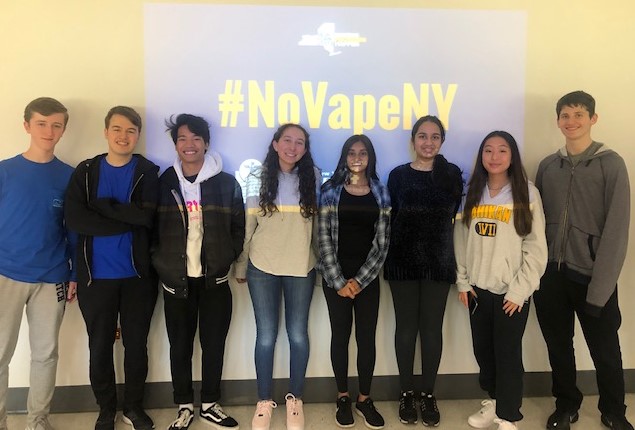The Wheatley School hosted a #NoVapeNY rally on Thursday at 3 pm to bring together concerned community members in the fight against teen vaping.
The event was organized by the Long Island Council on Alcoholism and Drug Dependence, the NYS PTA and Wheatley.
In fall 2019, the East Williston School District formed a committee tasked with proactively informing the youth community about the dangers of vaping and convincing teen e-cigarette users to quit. The task force is made up of students, parents, teachers and administrators seeking to combat the “vaping epidemic” and inform young people of the potential health risks of vaping, which include addiction, impaired brain development, increased heart rate and blood pressure, heart disease and lung injury.
“We as a school pride ourselves on fostering civic engagement in our youth,” stated Rahul Ajmera, a Wheatley senior and member of the task force. He explained that the committee takes a “student-centered approach” to the issue. Ajmera said that student members of the committee gave presentations to their peers on the health risks associated with vaping last fall.
Wheatley has additionally implemented an online vaping cessation program, disciplinary measures and bathroom monitors in order to deter student e-cigarette use.
At a task force meeting on November 26, students reported “a significant downturn in the popularity of vaping among their peers, with a diminished ‘cool factor,’ particularly among older students.”
Thursday’s event connected the community effort to combat teen vaping to the larger campaign happening at the state level.
On Feb. 20, Governor Andrew Cuomo launched the #NoVapeNY campaign and an anti-vaping website. He announced a package of initiatives he supports to combat youth e-cigarette use. The package includes a ban on all flavored vape products. Under the proposed legislation, the state Department of Health would be authorized to regulate the sale of flavored vape juice deemed a public health risk.
In 2019, Cuomo’s administration approved legislation to ban many flavored vaping products. The vaping industry successfully sued to block the legislation.
Many who spoke at the rally emphasized the marketing tactics that the industry employs to target teens.
“A decade ago, teen smoking was in a two-decade decline,” commented Dr. Howard Zucker, Commissioner of Health for New York State. Now, Zucker said, a new generation of nicotine products and new marketing strategies have created a crisis among youth.
Zucker pointed to the success of anti-cigarette campaigns targeted at young people in the 1990s and 2000s. “[Young people] saw these commercials and said, ‘This will not be me.’ But then vaping came along.”
The state-wide initiative aims to restrict vaping ads targeted to youth, and spread the message that vaping is a serious health hazard.
Steve Chassman, executive director of the Long Island Council on Alcoholism and Drug Dependence, addressed the rise of teen e-cigarette use from a mental health perspective. He stressed that nicotine is a stimulant, and therefore increases anxiety, stress and fear and decreases attention span.
“We’re not coping well,” stated Chassman. “What does a sixth grader need with three pods of nicotine a day?”
Chassman remarked that in the digital age, almost all of us struggle with attention deficiency to some extent, even without the added harm of nicotine addiction. He raised the question: Are young people turning to e-cigarettes at unprecedented rates because they feel like they can’t keep up?
The state’s effort to address the youth vaping uptick takes into consideration our increasing reliance on digital platforms.
On Friday, New York State launched a free text messaging program to help young people quit vaping.
Zucker explained that the program aims to provide the encouragement, motivation and skills that teens need in order to quit. To enroll, users can simply text “DropTheVape” to 88709.
Zucker stressed that although we are already aware that vaping has adverse effects on young people, it is too soon to know the full extent of the harm inflicted by e-cigarettes.
“It will take 20 or 30 years to find out the toxicity of vaping,” Zucker said. “But we know all about the toxicity of advertising.”



